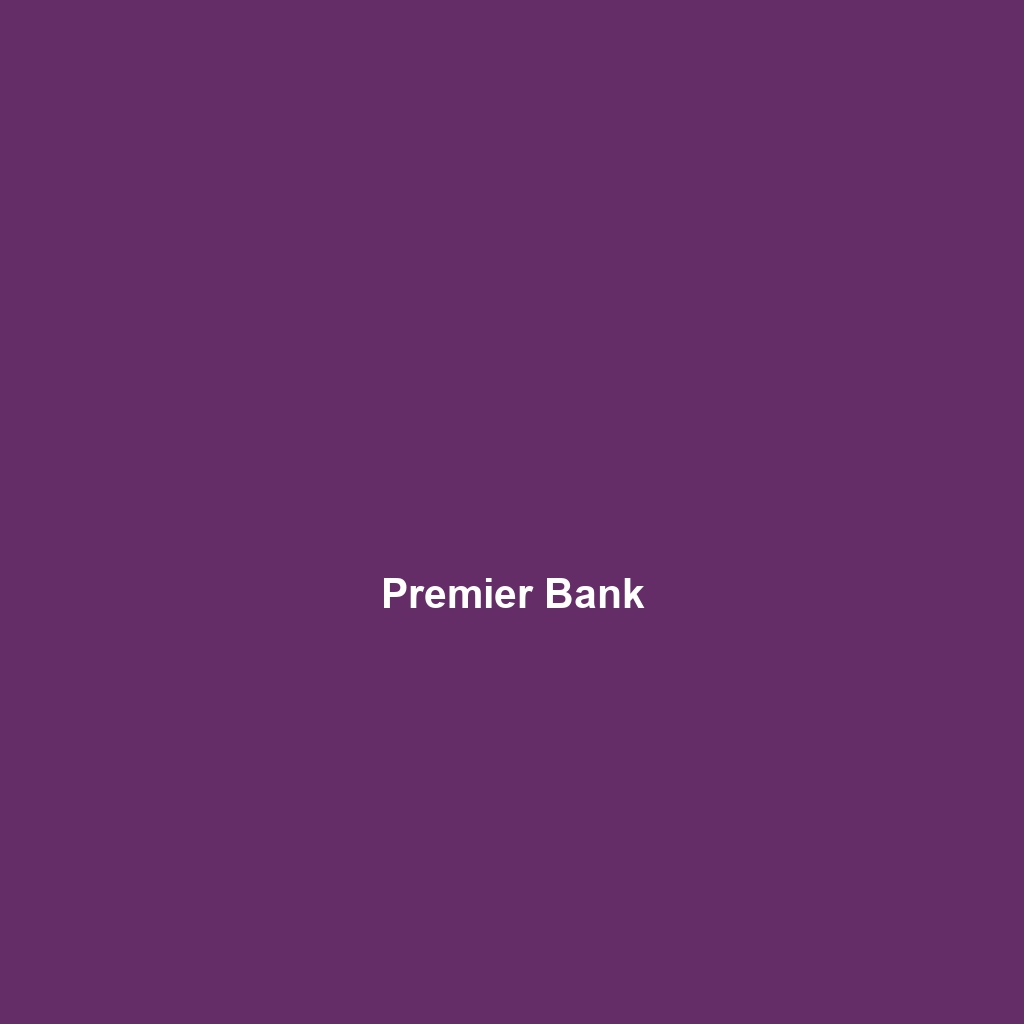Your cart is currently empty!
Tag: regulated financial institution

Cross River Bank
Overview
Cross River Bank is a New Jersey-based financial institution known for its innovative approach to banking. Founded in 2008, the bank operates as a chartered commercial bank and has gained recognition as a leader in the fintech space. Cross River Bank banks consumers, but its primary focus is on partnerships with technology firms and other financial institutions, providing tailored financial solutions that enhance the customer experience.
Services Offered
Cross River Bank provides a diverse array of financial services, including:
- Personal Banking: Checking and savings accounts with competitive rates.
- Business Banking: Small business loans and financing solutions tailored for entrepreneurs.
- Payment Solutions: Payment processing and lending platforms for merchants.
- Fintech Partnerships: White-label banking solutions integrated with various fintech applications.
Market Position
As a relatively young player in the banking sector, Cross River Bank has carved a unique niche by leveraging technology. The bank positions itself as an innovator that bridges the gap between traditional banking and fintech. Its partnerships with several prominent fintech companies, including Coinbase and Upgrade, have significantly enhanced its market presence, making it a vital component of the evolving financial landscape.
Financial Performance
- Yearly Revenue (2022): Estimated at over $150 million.
- Total Assets: Approximately $2.5 billion, reflecting robust growth.
- Net Income: Reported around $30 million in the last financial year.
- Loan Originations: Achieved a record of $1 billion in loan originations.
Customer Segments
Cross River Bank serves a broad range of customers, including:
- Individuals seeking personal banking solutions.
- Small businesses requiring financing and payment solutions.
- Fintech companies looking for banking partnerships.
- Investors interested in ethical and sustainable banking options.
Technology and Innovation
The bank is recognized for its forward-thinking technology approach, integrating advanced analytics, machine learning, and artificial intelligence (AI) into its operations. By focusing on a seamless user experience and efficient transaction processing, Cross River Bank has positioned itself as a technology-driven financial institution that meets the needs of modern consumers and businesses alike.
Recent Developments
In recent months, Cross River Bank has announced several critical developments:
- Launch of automated loan application processes to enhance customer experience.
- Expansion of its fintech partnerships, increasing the range of services offered.
- Introduction of new, competitive savings account options.
Branch and ATM Network
While Cross River Bank primarily operates online, it has strategically partnered with various financial institutions to extend its ATM and branch network. Customers can access services through a network of ATMs across the United States, ensuring flexibility and convenience.
Community and CSR Initiatives
Cross River Bank is committed to corporate social responsibility (CSR) and actively participates in community initiatives. The bank focuses on:
- Financial literacy programs that educate consumers, particularly in underserved areas.
- Community development projects supporting local economies.
- Sustainability efforts aimed at reducing its carbon footprint.
Key Executives
The leadership team at Cross River Bank comprises experienced professionals from both traditional banking and the fintech sector. Notable executives include:
- Gideon Stein, Founder & CEO
- Wendy Cai, CFO
- David Lichtenstein, Chief Technology Officer
Top Institutional Holders
Cross River Bank has attracted several institutional investors, reflecting its growth potential. Key institutional holders include:
- BlackRock
- Goldman Sachs
- Vanguard Group
Statistics
- Customer Base: Over 1 million customers.
- Loan Portfolio: $1.5 billion in loans.
- Employee Count: Approximately 300 employees.
- Net Interest Margin: Averaged at 4.5% in the last fiscal year.
Analysis and Future Outlook
Cross River Bank is poised for continued growth, particularly as digital banking trends persist post-pandemic. With an increasing number of consumers and businesses seeking online solutions, the bank’s commitment to technological innovation positions it well for future success. The reliance on fintech partnerships will remain a cornerstone of its growth strategy, allowing it to adapt to changing market demands efficiently.
Options Trading and Investor Sentiment
Investor sentiment around Cross River Bank remains optimistic, particularly as its innovative approach resonates with an increasingly digitized market. Recent reports have indicated strong institutional interest, and options trading reflects a bullish outlook on the bank’s stock, as investors anticipate an upward trajectory in the months to come.
Sustainability Initiatives
Cross River Bank has launched several sustainability initiatives aimed at promoting green banking practices. Notable focuses include:
- Offering green loans for environmentally friendly projects.
- Implementing policies to reduce paper usage and promote digital transactions.
- Involvement in community-based projects that support sustainability efforts.
Conclusion
Cross River Bank exemplifies the future of banking through its innovative technology solutions, strong market position, and commitment to community and CSR initiatives. As it continues to grow within the fintech space and expand its service offerings, Cross River Bank is well-positioned to play a pivotal role in the evolution of modern banking. To learn more about the bank and its services, visit the official website or explore articles and resources at UpCube.net.

Binance USD (BUSD)
Binance USD (BUSD): A Comprehensive Overview
Binance USD (BUSD) is a stablecoin issued by Binance, the world-renowned cryptocurrency exchange. Its ticker symbol is BUSD, reflecting its backing by the U.S. dollar at a 1:1 ratio, making it a popular choice for cryptocurrency traders and investors looking to maintain a stable digital asset amidst the volatility of the crypto market.
Founders, Launch Date, and History
BUSD was launched in September 2019 by Binance in collaboration with Paxos, a regulated financial institution. The creation of this cryptocurrency came at a time when the market was witnessing a surge in demand for stablecoins as a means to facilitate trading and provide liquidity. Key milestones in BUSD’s history include receiving approval from the New York State Department of Financial Services (NYDFS), which distinguishes it as one of the few stablecoins to operate under regulatory oversight.
Blockchain Platform
BUSD operates primarily on the Ethereum blockchain as an ERC-20 token, providing compatibility with various decentralized applications (dApps) and wallets. It leverages the advantages of Ethereum’s smart contract capabilities, enabling users to engage in a wide array of functionalities on the blockchain. Additionally, BUSD is also issued on the Binance Smart Chain (BSC), allowing for faster and cheaper transactions.
Purpose and Use Case
The primary purpose of BUSD is to serve as a stable digital currency for trading and financial interactions within the broader cryptocurrency ecosystem. Its use cases extend to DeFi applications, serving as a medium of exchange, collateral in lending platforms, and a tool for price stability during trading activities. By providing a stable asset, BUSD assists users in mitigating the risks associated with price volatility common in the cryptocurrency market.
Technology and Consensus Mechanism
BUSD benefits from the underlying technologies of the Ethereum and Binance Smart Chain networks. While BUSD itself does not utilize a consensus mechanism, it inherits the proof-of-work method from Ethereum and the delegated proof-of-stake mechanism from BSC. This enables a secure and efficient experience for users transacting with BUSD, while also supporting various blockchain-based functionalities.
Supply and Tokenomics
The maximum supply of BUSD is not capped; however, it is minted in tandem with the deposits of U.S. dollars, ensuring a 1:1 backing. Currently, the circulating supply is frequently updated through real-time audits conducted by PwC, enhancing transparency and trust. While BUSD does not offer staking rewards, it allows usage in liquidity pools and trading pairs that can yield returns for users in DeFi platforms.
Use Cases and Adoption
BUSD has found broad adoption across numerous real-world applications and partnerships. It is commonly used as a medium for trading pairs on major exchanges, facilitating smoother transactions in the cryptocurrency market. Additionally, BUSD is utilized by numerous DeFi projects, lending protocols, and payments systems, further showcasing its versatility as a stable digital asset.
Market Performance and Metrics
As of the latest updates, BUSD boasts a market cap consistently around the top tier of stablecoins, often exceeding $10 billion. The historical price trends showcase its stability, maintaining a value close to $1 due to its fiat backing. Trading volumes have remained robust, indicating a healthy demand for BUSD amid fluctuating market conditions.
Where to Buy and Trade
BUSD can be traded on various centralized exchanges (CEXs) such as Binance, Coinbase, and Kraken. Additionally, it is available on decentralized exchanges (DEXs) like Uniswap and PancakeSwap, providing users with flexibility in trading and liquidity provision.
Security and Risks
BUSD has a strong security framework, bolstered by the backing of Paxos, which is under regulatory oversight in New York. However, like any cryptocurrency, risks remain, including regulatory changes and market fluctuations. Users should remain vigilant about potential vulnerabilities and conduct thorough research before investing.
Community and Governance
The governance model for BUSD revolves around transparency and regulatory compliance, driven by its partnership with Paxos. Community engagement is facilitated through forums and social media, allowing users to stay updated with developments and governance-related discussions.
Competitors and Differentiation
Drawing comparisons with other stablecoins like Tether (USDT) and USD Coin (USDC), BUSD distinguishes itself through its regulatory compliance and backing by a licensed trust company. Its dual issuance on Ethereum and Binance Smart Chain also sets it apart, enhancing its utility across different platforms.
Roadmap and Future Developments
Looking ahead, BUSD is expected to expand its integrations within the DeFi space and attract additional partnerships to enhance its ecosystem. Plans for further technological enhancements and potential listings on more exchanges underscore its commitment to sustained growth and adoption.
Wallet Compatibility
BUSD is supported by various cryptocurrency wallets, including hardware wallets like Ledger and Trezor, as well as software wallets such as MetaMask and Trust Wallet. This broad compatibility allows users to easily store and manage their BUSD assets securely.
Regulatory and Compliance Status
Due to its backing by a regulated entity, BUSD is compliant with existing regulations, providing an extra layer of trust for users. Nonetheless, the evolving regulatory landscape for cryptocurrencies can pose challenges and uncertainties in the long term.
Recent News and Updates
In recent months, BUSD has continued to expand its partnerships and enhance its services. Noteworthy collaborations in the DeFi sector have boosted its use cases, while regular audits ensure transparency and trustworthiness for users holding the stablecoin.
Summary and Call to Action
Binance USD (BUSD) presents a compelling option for those seeking stability in the volatile world of cryptocurrency. With its regulatory backing, significant market presence, and versatile use cases in DeFi and trading, BUSD remains an essential asset for traders and investors alike. For those interested in exploring BUSD further, we encourage you to do your research and consider incorporating it into your cryptocurrency portfolio.
For additional insights, visit UpCube.net. For more information, check out the official website and whitepaper.
This well-researched, SEO-optimized description of Binance USD (BUSD) emphasizes its relevance in the current cryptocurrency landscape while covering various aspects thoroughly.